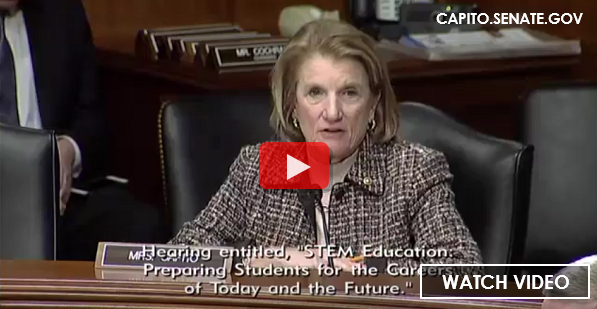
Click here or the image above to watch Senator Capito’s opening questions.
WASHINGTON, D.C. – Today, U.S. Senator Shelley Moore Capito (R-W.Va.), a member of the Senate Appropriations Subcommittee on Labor, Health and Human Services, Education, and Related Agencies, participated in a hearing focused on STEM (Science, Technology, Engineering and Math) education. Senator Capito was joined by Dr. Sarah Tucker, Chancellor of the West Virginia Council for Community & Technical College Education, who was invited to serve as a witness.
Dr. Tucker’s remarks highlighted how STEM programs and business and industry partnerships are helping West Virginians get the education and training they need to succeed in today’s evolving economy.
“Investing in STEM education holds such promise and possibility,” said Senator Capito. “I was glad to have the opportunity to discuss this important topic during today’s hearing, which highlighted how STEM can strengthen our economy by creating more jobs and improving health and well-being. These are the jobs of the future and we must continue investing in this field so we can attract, retain and help West Virginians reach their full potential.”
“Our typical community college students in West Virginia have families to feed, mortgage and car payments, childcare issues, and sometimes parents for whom to care. Many are either out or work or are under-employed,” Dr. Tucker told the committee. “These circumstances often cause our students to need to get into and out of a program that will lead to a high-wage career as quickly as possible. In West Virginia, nearly all of those careers are in the STEM fields.”
Through her position on the Appropriations Committee, Senator Capito has supported increased funding to expand STEM research at community colleges and other institutions in West Virginia, such as West Virginia University and Marshall University. Additionally, the Senator helped provide $19 million for dislocated worker training specifically for areas adversely impacted by the downturn in the coal industry. The ability to retrain workers, learn new skills, and study areas, particularly in the STEM fields, are critical to West Virginians ability to adapt in a diverse economy.
Watch the full hearing here.
###